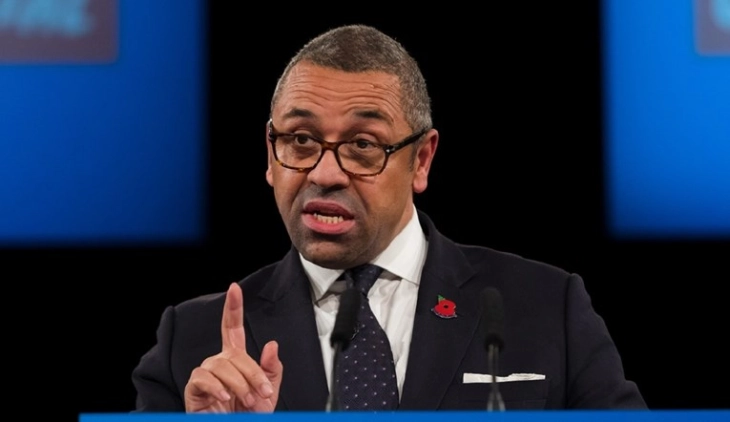Britain pledges more ambulances for Ukraine during minister's visit

London, 25 November 2022 (PA Media/dpa/MIA) – British Foreign Secretary James Cleverly has announced a package of “hands-on” support to help Ukraine through the winter while on a visit to the war-torn nation.
Cleverly was due to meet President Volodymyr Zelensky during his trip, which comes days after British Prime Minister Rishi Sunak travelled to Kiev.
Cleverly announced the practical support as Ukraine’s power grid and other critical infrastructure has been pounded by Russian strikes, causing blackouts and leaving millions without heat, power or water as temperatures plummet.
Thanking Ukrainian Foreign Minister Dmytro Kuleba for welcoming him to the country, and sharing a photo of their meeting, he insisted words alone “won’t keep the lights on” or “defend against Russian missiles.”
“The UK isn’t just talking about Ukraine, we’re providing concrete support for the defence of Ukraine,” he tweeted on Friday morning.
“Thank you @DmytroKuleba for welcoming me to Kyiv.”
Britain will send 35 more emergency vehicles, including 24 ambulances and six armoured vehicles, to the country.
The foreign secretary also announced a further £3 million ($3.6 million) for the rebuilding of local infrastructure including schools and shelters, as well as additional funding to support survivors of sexual assault.
Cleverly said: “As winter sets in, Russia is continuing to try and break Ukrainian resolve through its brutal attacks on civilians, hospitals and energy infrastructure. Russia will fail.
“The UK stands shoulder to shoulder with Ukraine. I have today announced a package of hands-on support for our Ukrainian friends in their fight, from ambulances to crucial support for survivors of the sexual violence carried out by the Russian military.
“I’ve seen here first-hand how the UK’s efforts are helping brave citizens to resist and rebuild. Our support will continue for as long as it takes for this remarkable country to recover.”
Britain is also committing £5 million to a Ukraine-led initiative, delivered through the UN World Food Programme, to ship grain to countries most at risk of famine, including Yemen and Sudan.
Environment Secretary Therese Coffey said: “I am pleased the UK government can support President Zelensky’s work to help Ukraine’s grain reach some of the poorest and most vulnerable nations in the world.
“Global food security is in all our interests – and helping Ukraine’s farmers and agricultural sector to continue producing and exporting food in these most difficult of circumstances is vital for that security.”
Sunak’s visit to Kyiev last Saturday was accompanied by the announcement of a £50 million package of defence aid comprising 125 anti-aircraft guns and technology to help Ukraine counter Iranian-supplied drones, including radars and anti-drone equipment.
The British prime minister said it was “deeply humbling” to be in the Ukrainian capital and that he was “proud” of how Britain had backed the country since Moscow’s invasion began.
His vocal support for Kiev sees him follow in the footsteps of his predecessors Boris Johnson and Liz Truss.
Many Russian troops are being compelled to serve in Ukraine with “serious” health problems, while those forced to build trenches under fire are likely to have suffered “particularly heavy casualties,” British defence experts believe.
A number of “common themes” are emerging in the experience of Moscow’s mobilized reservists, according to the British Ministry of Defence (MoD), with their deployment often characterized by “inadequate” training and personal equipment.
An MoD defence intelligence update suggests the Kremlin will likely be concerned that an increasing number of families are prepared to risk arrest by protesting against the conditions their relatives face at war.
Most mobilized reservists have previously served, it says, with “numerous examples” suggesting it is highly probably they are not having their medical status “adequately reviewed.”
“Many are being compelled to serve with serious, chronic health conditions,” the update states.
It also suggests there are likely to have been “particularly heavy casualties” among those committed to dig “ambitious trench systems” while under artillery fire around the city of Svatove, in the Luhansk region.
Meanwhile, reservists have been killed in “large numbers” in frontal assaults into well-established Ukrainian defensive zones in the Donetsk region, around the city of Bakhmut, it says.
“Two months after President [Vladimir] Putin announced a ‘partial mobilization,’ common themes are emerging in the experience of mobilised Russian reservists,” the update states.
“Their deployment is often characterized by confusion over eligibility for service, inadequate training and personal equipment, and commitment to highly attritional combat missions.
“Most – though not all – mobilized reservists have previously served and numerous examples suggest that reservists are highly likely not having their medical status adequately reviewed and many are being compelled to serve with serious, chronic health conditions.
“Mobilized reservists have highly likely experienced particularly heavy casualties after being committed to dig ambitious trench systems while under artillery fire around the Luhansk Oblast [Province] town of Svatove.
“In Donetsk Oblast, reservists have been killed in large numbers in frontal assaults into well-established Ukrainian defensive zones around the town of Bakhmut.
“The Kremlin will likely be concerned that an increasing number of reservists’ families are prepared to risk arrest by protesting against the conditions their relatives are serving under.”







